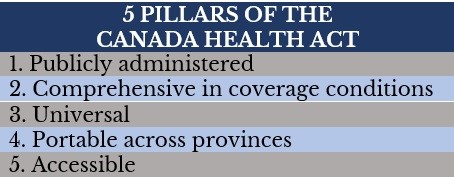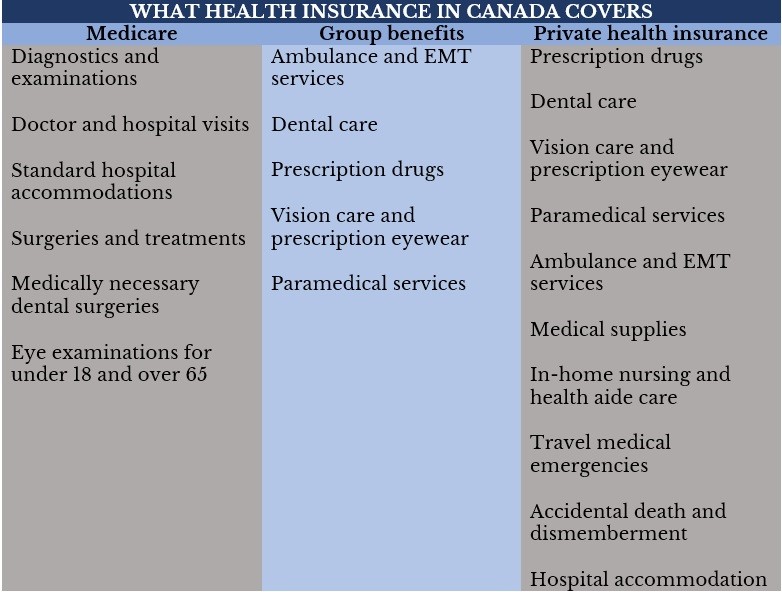

Canada boasts one of the world’s most comprehensive healthcare systems, providing free access to emergency care and regular doctor visits to all citizens and permanent residents. However, the country’s universal healthcare system does not cover everything. There are still certain services that Canadians need to pay for out of pocket, prompting many to take out private or personal health insurance.
Insurance Business delves deeper into public healthcare and health insurance in Canada in this article. If you’re working out whether getting private health coverage is necessary or if Medicare already provides sufficient protection, you’ve come to the right place. Here, we will discuss how both types of coverage work, what they include, and what is excluded. We also encourage insurance professionals to share this piece with their clients to help them gain useful insights regarding their healthcare. Read on and pad your knowledge about health insurance in Canada.
The country runs a publicly funded healthcare system under the Canada Health Act (CHA). The CHA also sets out “five pillars” that all provincial and territorial health insurance in Canada must comply with to receive full federal cash contributions. These are:

Healthcare in the country is primarily run and administered by all 13 provinces and territories, each with its own health insurance plan. Each province and territory also receive funding from the federal government on a per-capita basis. While the benefits and how these are delivered vary, according to Canada.ca, the basics remain the same – “universal coverage for medically necessary health care services [are] provided on the basis of need, rather than the ability to pay.”
The government website adds that provinces and territories are given “considerable leeway” on how to fund health insurance plans. These can be done through provincial and territorial revenues, payroll and sales taxes, and a combination of these.
Canada allows the charging of health insurance premiums as long as residents are not denied coverage for medically necessary treatments and services because they cannot afford premium payments. Provinces and territories that levy premiums must also offer income-based financial assistance, so that low-income individuals and families can have their premiums reduced or waived.
To be eligible to access Canada’s national health insurance program, one must be a resident of any province or territory. But who is considered a resident? According to the CHA, a resident is a “person lawfully entitled to be or to remain in Canada, who makes his home and is ordinarily present in the province.” The Act also specifically excludes tourists and visitors.
Provinces and territories are responsible for setting their minimum residential qualifications when it comes to healthcare in Canada. The only other requirement that the CHA imposes is limiting the waiting periods for establishing eligibility for health insurance plans to three months. Most provinces and territories require residents to be physically present for at least 183 days to access free healthcare. If you’re leaving your residence for a long period, you must also provide proof of your intent to return.
However, if you’re moving to a different province or territory, health insurance in Canada can continue to cover you during a minimum waiting period imposed in your new residence. Once this has elapsed, your new province or territory assumes your healthcare coverage.
Universal health insurance in Canada provides coverage for many of the essential healthcare and medical treatments and services. These include:
What the national health insurance program covers varies between provinces and territories. You can check out the links in the table below to find out what healthcare covers where you live.
|
WHAT DOES MEDICARE COVER IN YOUR PROVINCE? |
|
|---|---|
Each province and territory has their own rules when it comes to what is covered by health insurance, so the exclusions may vary. For the following services and treatments, you may need to take out private health insurance to obtain cover, depending on where you live.
Although not exactly considered health insurance, another type of coverage that’s not always accessible in the country is long-term care insurance. You can find out the benefits and drawbacks of long-term care insurance in Canada in our comprehensive guide.
With the long list of what is typically excluded from Canadian healthcare, it is not surprising that, while not required, almost 70% of Canadians have purchased supplemental private health insurance based on the latest data from the Canadian Life and Health Insurance Association (CLHIA).
CLHIA’s figures also indicate that 90% of all private health insurance policies were obtained through group plans. This is the reason why it recommends that you check your employer’s benefits plans first before buying additional health coverage to ensure that you are not paying for something that you’re already covered for.
If you’re a retiree, self-employed, or not eligible for group benefits, then purchasing supplemental health cover is advisable. Private health insurance covers several treatments and services excluded from the national health insurance program, including the ones listed above. The Financial Consumer Agency of Canada (FCAC) listed three main benefits of taking out private health coverage. These are:
Another important benefit of private health insurance is dental care coverage, which is not included under CHA. If you want to find out the different ways you can access dental insurance in Canada, our comprehensive guide can help you.
The table below gives a side-by-side comparison of what each type of health insurance in Canada covers.

Most private health insurance policies also come with a deductible. This is the amount that you must pay out of pocket before your health insurer picks up the tab. You can check out our comprehensive guide to insurance deductibles if you want to learn more about how this insurance component works.
Private health insurance in Canada costs about $756 annually or about $63 per month, according to the latest figures gathered by the Canadian Institute for Health Information (CIHI). The institute’s research also revealed that the average Canadian pays out about $902 in out-of-pocket expenses each year, equivalent to around $75 monthly.
CIHI’s data, however, were taken before the coronavirus pandemic shook not just the country’s healthcare system but also that of the world, which means actual values may be significantly higher at present. The figures above are likewise mere estimates. Still, the best way to get an accurate quote is to contact an experienced health insurance professional.
The country is home to about 130 private health insurance providers, which serve more than 27 million Canadians, according to CLHIA’s most recent data. Here are some other notable numbers from CLHIA’s latest industry factbook, indicating a thriving private health insurance market.
These were the top five reasons for filing claims based on the research.
The answer depends on your and your family’s healthcare needs. While Canada’s universal health program provides coverage for many essential medical treatments and services, healthcare often extends beyond what our provincial or territorial health plans cover.
As CLHIA’s factbook reveals, prescription drugs and dental care are the two biggest reasons for filing claims as these are also the two largest healthcare expenses Canadians incur. So, if you’re taking regular medication or making frequent visits to the dentist, taking out private health insurance can prove beneficial.
Purchasing supplemental health coverage may also be advantageous for those without access to workplace benefits, including self-employed individuals and retirees. The bottom line is, if you’re trying to work out if health insurance is worth taking out, it pays to assess your overall health condition first. It will also help if you can talk to an experienced insurance professional who can give you a thorough breakdown of the pros and cons of purchasing health insurance in Canada.
If you want to keep abreast of the latest updates in the health insurance space, you can visit Insurance Business’ Life & Health section for breaking news and other industry developments.
Do you think health insurance in Canada is a worthwhile expense? What are the benefits and drawbacks of purchasing one? Chat with us in the comment section below.
